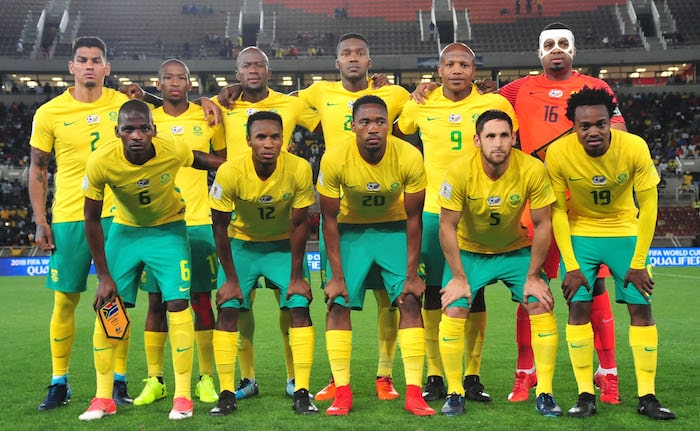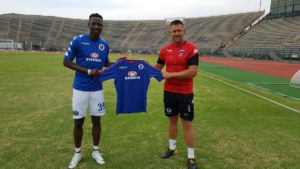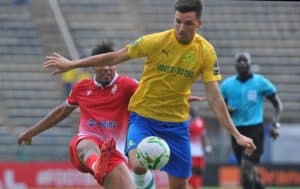Bafana Bafana should take a leaf out of Nigeria’s 2018 World Cup qualification for future success, writes Nkareng Matshe.
Another World Cup is upon us and, once again, Bafana Bafana will not be there.
The last time our national team played in the tournament through qualifying was 2002, an indication that something has gone horribly wrong since the heady days ofthe mid-1990s.
#FlashbackFriday – The last time @BafanaBafana qualified for the #WorldCup⬇
📅 17 May 2002
📌 #BafanaBafana farewell dinner for World CupFavourite player?🤔⬇⚽
🎯Siyabonga “Bhele” Nomvethe
⚡Jabu “Shuffle” Pule
♠️Thabo Mngomeni pic.twitter.com/km8zQD1NOq— Diski Football Battles (@DiskiBattles) June 8, 2018
ALSO READ: Bafana fall in Fifa rankings
While Bafana have regressed, other teams have managed to get their house in order, despite various pitfalls.
This year, Africa will be represented in Russia by five of its top six teams. Tunisia and Senegal occupy the first and second spots in the continental rankings respectively, followed by DR Congo, who are not World Cup-bound, while Morocco, Egypt and Nigeria fill the next three places.
If there’s a team that’s closer to Bafana in terms of football dynamics, politics and administrative chaos, it is Nigeria’s Super Eagles. The question then is, how did they manage to secure a ticket to Russia?
Like Bafana, Nigeria weren’t at the 2017 Africa Cup of Nations in Gabon. In fact, they last qualified for an Afcon in 2013, which they won under the late Stephen Keshi.
Last year they managed a turnaround that saw them win four of their five World Cup qualifiers in a tough group – including Zambia, Cameroon and Algeria – to become the first African country to book a spot in Russia.
The Super Eagles, admittedly, have better players than Bafana, including Victor Moses of Chelsea, Arsenal’s Alex Iwobi and Kelechi Iheanacho of Leicester City.
ALSO READ: Mbappe reveals his World Cup idol
Bafana still have a long way to go, but the situation has improved a bit, with Bongani Zungu (left) and Keagan Dolly getting game time in the French league.
Having players turning out regularly in European leagues is the best way for Bafana to improve from being minnows to World Cup qualifiers.
✈✈🇳🇬✈🇳🇬✈🇳🇬✈🇳🇬✈✈🇳🇬⚽⚽⚽ #SoarSuperEagles #Team9jaStrong – #regrann pic.twitter.com/jnJO77UQYA
— The NFF 🇳🇬 (@thenff) June 11, 2018
Stability on the coaching front is also a must.
Nigeria called on the experienced Gernot Rohr after some years of uncertainty.
The German suffered an embarrassing home loss in his first official match in charge – ironically, against Bafana in a 2019 Afcon qualifier last June – but he was backed by his football association.
A few months later Nigeria were on their way to Russia, with a match to spare.
The SA Football Association (Safa) will have to similarly support Stuart Baxter all the way to Qatar 2022.
Safa has its own troubles, however. In March this year, Baxter and the association publicly clashed over Bafana’s schedule, with the coach asking his employers to‘get their house in order’.
ALSO READ: African stars who could earn EPL moves after WC
Baxter was adamant he should have been allowed to take the team to a tournament in Thailand, but Safa told him ‘a week before’ he had to head to a four-nations event in Zambia instead.
Baxter has also still not appointed an assistant coach. But it’s on the playing field where Bafana will have to produce the goods. It does look promising, though. Zungu and Dolly have found their feet abroad, adding to the overseas pool that includes Kamohelo Mokotjo, Lebo Mothiba and Luther Singh.
ALSO READ: Test of strength for Africa at World Cup
They should soon be joined by the exceptional Percy Tau.
Baxter should mould his team around such players if Bafana are to qualify for the next World Cup.
-This feature originally appeared in the TFG SoccerClub magazine





